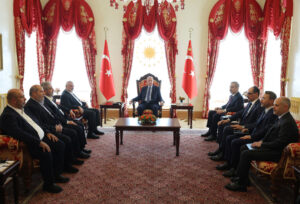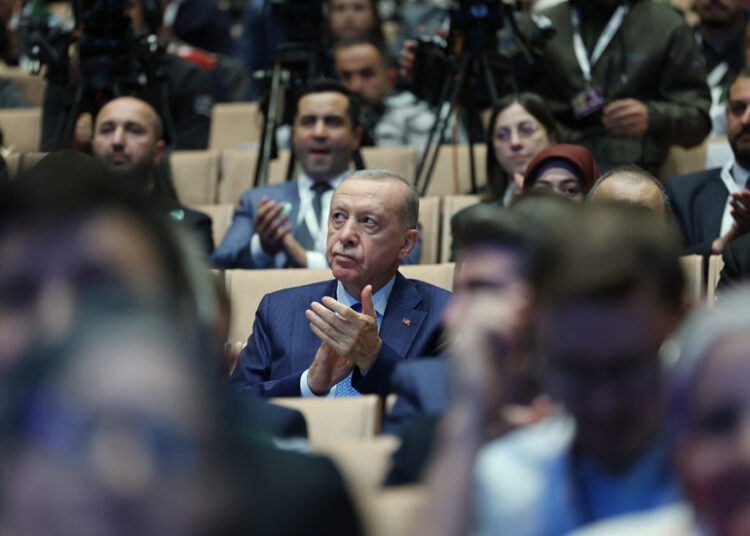Abdullah Bozkurt/Stockholm
Turkey has emerged as a new source of financial support for Hezbollah, the Iranian-backed proxy group in Lebanon, which has come under intense pressure from Israeli military operations and US Treasury sanctions.
In a formal complaint submitted to the United Nations Security Council, Israel accused Turkey of acting as a financial conduit for the Lebanese militant group Hezbollah. The complaint cited specific flights originating from Turkey that allegedly transported cash intended for the organization.
In a letter dated February 20, 2025, Israeli Ambassador to the United Nations Danny Danon addressed the Security Council and Secretary-General António Guterres, detailing what Israel characterizes as “persistent violations” of Security Council Resolution 1701 as well as breaches of the Ceasefire Understanding reached with Lebanon in November 2024.
The letter accuses Hezbollah of reconstructing its military infrastructure and engaging in cross-border activities, in direct violation of the ceasefire agreement.
Of particular relevance to Turkey, the annex to the letter outlines financial transfers to Hezbollah, routed through intermediaries operating within Turkish territory. According to Israeli intelligence shared with the US-led International Monitoring and Implementation Mechanism, funds believed to be earmarked for Hezbollah’s military operations have been funneled through commercial channels between Iran and Lebanon, with Turkish entities reportedly serving a facilitative role in the transactions.
The evidence submitted to the United Nations includes two Turkish flights — one on February 7, 2025, and another on February 9 — that landed at Beirut International Airport carrying cash intended for Hezbollah.
A letter submitted to the UN Security Council by the Israeli ambassador details cash routed to Lebanon’s militant group Hezbollah in violation of UN sanctions:
Although no specific Turkish officials or organizations were directly implicated, Israel’s allegations were unsurprising in light of the staunchly anti-Israel stance adopted by the Islamist government of President Recep Tayyip Erdogan. Ankara has increasingly aligned itself with Iran on a range of regional issues, including support for Hamas and vocal opposition to the US-led coalition’s military campaign against Iran-backed Houthi forces in Yemen.
Erdogan has been sharply critical of Israeli military operations targeting Hezbollah in Lebanon. In a statement posted on X on September 28, 2024, he wrote, “Israel’s genocide, occupation and invasion policy, which has been ongoing since October 7 [2023], has now set its sights on Lebanon and the Lebanese people.” He further accused Israel of “openly defying all of humanity, humanitarian values and international law.”
Erdogan’s remarks came one day after Hezbollah leader Hassan Nasrallah was killed in an Israeli military strike in Lebanon.
Two days later, speaking at a cabinet meeting, Erdogan intensified his criticism of Israel, stating, “A handful of radical Zionists, blinded by blood and hatred, are dragging our region and the entire world into flames. We will never consent to this oppression, this barbarity.” He further declared that Turkey would stand by Lebanon and Palestine, asserting that this stance was a defense of humanity against Israel’s alleged barbarism.

On October 1, 2024, during the opening session of parliament, Erdogan vowed to provide Lebanon with all available resources in the face of Israeli attacks. He claimed that Israel aimed to invade Turkish territory following its operations in Lebanon, likened Israeli Prime Minister Benjamin Netanyahu to Adolf Hitler and asserted that Netanyahu’s actions would eventually be stopped.
Israel’s letter further accuses Hezbollah of operating weapons production sites and storage facilities in Lebanon, maintaining a military presence south of the Litani River, and conducting reconnaissance missions near the Israeli border — each of which constitutes a violation of UN resolutions.
Among the more serious allegations is the reported existence of a 3-kilometer smuggling tunnel in Lebanon’s Bekaa Valley, allegedly operated by Hezbollah’s Unit 4400 to facilitate the transfer of Iranian weapons. Israel claims the tunnel was targeted in two separate military strikes but remained operational as of early February 2025.
Danon further accused elements within the Lebanese Armed Forces (LAF), including its military intelligence units, of colluding with Hezbollah by sharing sensitive information obtained by international monitors.
The letter concludes with a call for Security Council action, urging pressure on Lebanon to fully implement its obligations under Resolution 1701, sanctions against Iran and measures by all member states to disrupt Hezbollah’s financing, particularly through third-party territories such as Turkey.
Israeli intelligence submitted evidence detailing two Turkish flights that carried cash for Lebanon’s Hezbollah in February 2025:
Turkey has already been the target of a series of US Treasury sanctions, due to entities and individuals linked to terrorist-designated groups such as Hamas, Islamic Jihad and Hezbollah operating within its borders. These groups have reportedly utilized Turkey’s financial and banking systems not only to transfer funds but also to raise money domestically.
Iran’s Quds Force operatives in Turkey have been active for years with apparent impunity, particularly following the derailment of the country’s largest criminal investigation into the Quds Force’s Turkish network, Tevhid Selam, in February 2014. The investigation implicated senior Turkish officials, including President Erdogan’s chief Middle East advisor, Seyfi Turan, and Turkey’s foreign minister, Hakan Fidan, who was head of the National Intelligence Organization (MIT) at the time.
Quds Force operative Sıtkı Ayan, a Turkish national who had collaborated with the Quds Force’s Gen. Behnam Shahriyari — who operated under the alias Sayed Ali Akber Mir Vakili in Turkey — was also a suspect in the Turkish investigation. Although all suspects in the terrorism case were shielded by the Erdogan government, Ayan and Shahriyari were indicted in February 2024 by US federal prosecutors in Manhattan on multiple charges, including terrorism, sanctions evasion, fraud and money laundering, all related to financing Quds Force operations.
Ayan has frequently traveled to Lebanon to conduct business with Iranian operatives. He has long been a close associate of Turkish President Erdogan, to whom he reportedly provided millions of dollars in cash as bribes, derived from his clandestine oil and gas dealings with the Iranian regime.












